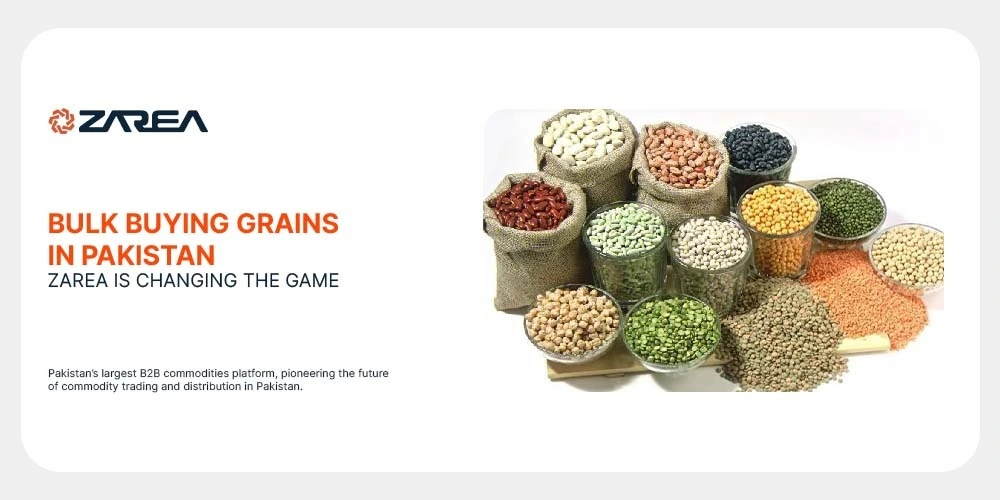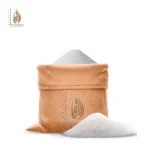Introduction – Buying Grains in Bulk:
Compared to other food items like roots, fresh fruits, and tubers, grains are easier to measure, store, and transport since they are tiny, dry, and hard. The growth of grain cultivation has historically made it possible to create excess food. Because grains are readily kept, agricultural society may have been divided into classes and the first permanent towns may have been established.
Buying grains in bulk has been a crucial tactic in recent years for both homes and companies looking to control growing expenses and guarantee a steady supply. Reliable, scalable sourcing is more important than ever as the need for food rises in tandem with population growth and economic changes. Zarea, the top B2B commodities platform in Pakistan, is revolutionising this market.
The State of Buying Grains in Bulk:
Pakistan’s agricultural economy and food security are based on grains. In addition to being essential for the home, staples including wheat, rice, maize, barley, and pulses are also essential for the country’s export and trading networks. However, inefficiencies have long plagued Pakistan’s conventional grain delivery system:
- Inconsistent pricing
- Middlemen exploitation
- Quality assurance issues
- Limited transparency in supply chains
These challenges have made bulk purchasing a risky endeavor for small retailers, food processors, and even larger buyers.
Why Bulk Buying Matters:
Bulk buying offers several advantages:
- Lower per-unit costs
- Better inventory control
- Reduced dependency on volatile markets
- Increased profit margins for businesses
Yet, it demands access to trusted suppliers, real-time pricing data, and logistic reliability—components that Pakistan’s conventional grain markets struggle to provide.
Zarea – Revolutionising Bulk Grain Trade:
Zarea is addressing these issues head-on by digitizing and streamlining how businesses purchase grains in Pakistan. As the country’s largest B2B commodities marketplace, Zarea connects verified grain suppliers directly with buyers—cutting out middlemen, ensuring product quality, and providing transparent pricing.
Purchase Grains and Pulses Through Zarea:
Zarea makes every attempt to meet the demands of its clients and works hard to give them pure, hygienic grains and pulses. We are among Pakistan’s biggest exporters of pulses and grains. To view the most recent price list, click here.
Here’s how Zarea is changing the game:
Verified Suppliers Network
- Zarea curates a list of trusted vendors dealing in daal chana, daal mash, masoor, mong, wheat, rice, and other staple grains.
- Buyers are assured of quality and compliance.
Real-Time Pricing and Transparency
- Market rates are updated regularly, allowing businesses to buy at the best available prices.
- No hidden charges or surprise commissions.
Bulk Order Customization
- Buyers can place customized orders by volume, grain type, or frequency.
- This flexibility suits the needs of manufacturers, retailers, and hospitality chains.
Nationwide Delivery
- Zarea’s logistic partners ensure timely delivery to cities and remote regions alike.
Digital Payments and Recordkeeping
- Fully digitized invoicing and payment solutions ensure accountability and ease of transaction.
Impact on the Grain Industry in Pakistan:
Zarea’s digital-first approach is helping modernize an otherwise traditional sector. By empowering businesses with control, visibility, and competitive pricing, the platform is driving:
- Greater market efficiency
- Reduced food waste
- Sustainable growth for small and large players
This shift is particularly impactful for food manufacturers, caterers, and wholesalers who need large volumes of buying grains in bulk on a regular basis.
The Future of Bulk Grain Buying in Pakistan:
As technology continues to shape agriculture and food distribution, platforms like Zarea are expected to lead the charge in:
- Promoting fair trade practices
- Supporting farm-to-business supply chains
- Ensuring price stability for essential commodities
In addition to addressing today’s issues, Zarea is clearing the path for a more efficient and sustainable grain market in Pakistan by bringing buyers and sellers together via a dependable, data-driven ecosystem.
Final Thoughts:
There is no denying Pakistan’s need for effective, reasonably priced, and high-quality bulk grain purchasing. Grain purchasing and sales are changing as a result of Zarea’s inventiveness and dedication to openness, accessibility, and size. Zarea is more than just a marketplace for companies that depend on a steady supply of grain; it’s a competitive advantage.
FAQ’s:
What is the cheapest grain to buy?
Examples of Grain That Are Affordable:
- Wheat
- Rice
- Maize
- Flakes, ready-to-eat cereal
- Barley
- Pulses
Which 5 Grains Should You Avoid?
High-carbohydrate grains to be aware of:
- white bread.
- refined pasta.
- white rice.
- crackers.
- breakfast cereal.
Why would you want to buy whole grains in bulk?
Having your own mill and purchasing in bulk allows you to store a large quantity of grains, which will allow you to make flour whenever you want without having to worry about grinding them all at once and spoiling any that you don’t use right away. Grains in their whole form are very shelf stable and last a very long time.
How can I get whole grains?
To increase the amount of whole grains in your meals and snacks, try these suggestions: Savour breakfasts that contain whole-grain cereals like muesli, shredded wheat or whole-wheat bran flakes. Instead of using ordinary bagels, use whole-wheat toast or whole-grain bagels. Replace pastries with whole-grain, low-fat muffins.
Which is the healthiest grain?
Traditionally, barley is offered in grain bowls, salads, and soups. In addition to a variety of phytochemicals and the soluble fibre beta-glucan, it boasts a greater dietary fibre content than any other grain. These antioxidants have the potential to boost immunity and lower harmful cholesterol.
































